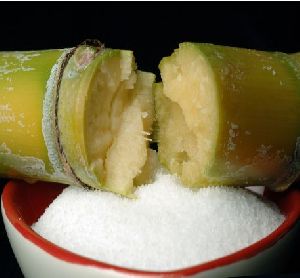
Organic Jaggery
100 Per 900 Gram
Our jaggery is certified as organic jaggery as per organic jaggery standard. This jaggery rich in vitamin c which keeps us healthy. Its taste is very sweet not salty. Our jaggery is kolhapuri jaggery

Jaggery Powder
40 - 100 Per Kilogram
18 Ton (MOQ)
Best Deals from Organic Sugar

White Sugar
34 Per Kilogram
Sugar has been produced in the Indian subcontinent. Sugarcane was a native of tropical areas such as the Indian subcontinent (South Asia) and Southeast Asia. Scientifically, sugar loosely refers to a number of carbohydrates, such as monosaccharide, disaccharides, or oligosaccharides. Monosaccharide are also called "simple sugars", the most important being glucose. This is a list of sugars and sugar products. Sugar is the generalized name for sweet, short-chain, soluble carbohydrates, many of which are used in food. They are composed of carbon, hydrogen, and oxygen. There are various types of sugar derived from different sources. Generally speaking, chemical names ending in -ose indicate sugars. "Syrup" indicates a sugary solution. Malting is a way of processing starchy grains like wheat and barley into sugar, so "malt extract" will be mostly sugar. Sugar is mostly extracted from plants by juicing them, then drying the purified juice, so "evaporated cane juice crystals" or "concentrated grape juice" are also very similar to pure sugars. Process of Sugar production Sugar cane requires a frost-free climate with sufficient rainfall during the growing season to make full use of the plant's substantial growth potential. The crop is harvested mechanically or by hand, chopped into lengths and conveyed rapidly to the processing plant (commonly known as a sugar mill) where it is either milled and the juice extracted with water or extracted by diffusion. The juice is clarified with lime and heated to destroy enzymes. The resulting thin syrup is concentrated in a series of evaporators, after which further water is removed. The resulting supersaturated solution is seeded with sugar crystals, facilitating crystal formation and drying. Molasses is a by-product of the process and the fiber from the stems, known as bagasse, is burned to provide energy for the sugar extraction process. The crystals of raw sugar have a sticky brown coating and either can be used as they are, can be bleached by sulfur dioxide, or can be treated in a carbonatation process to produce a whiter product. About 2,500 litres (660 US gal) of irrigation water is needed for every one kilogram (2.2 pounds) of sugar produced. Refining Refined sugar is made from raw sugar that has undergone a refining process to remove the molasses. Raw sugar is sucrose which is extracted from sugarcane or sugar beet. While raw sugar can be consumedwhite sugar, the refining process removes unwanted tastes and results in refined sugar or . The sugar may be transported in bulk to the country where it will be used and the refining process often takes place there. The first stage is known as affination and involves immersing the sugar crystals in a concentrated syrup that softens and removes the sticky brown coating without dissolving them. The crystals are then separated from the liquor and dissolved in water. The resulting syrup is treated either by a carbonatation or by a phosphatation process. Both involve the precipitation of a fine solid in the syrup and when this is filtered out, many of the impurities are removed at the same time. Removal of color is achieved by using either a granular activated carbon or an ion-exchange resin. The sugar syrup is concentrated by boiling and then cooled and seeded with sugar crystals, causing the sugar to crystallize out. The liquor is spun off in a centrifuge and the white crystals are dried in hot air and ready to be packaged or used. The surplus liquor is made into refiners' molasses. Refined sugar is widely used for industrial needs for higher quality. In most parts of the world, sugar is an important part of the human diet, making food more palatable and providing food energy. Nutrition & Flavour Brown and white granulated sugar are 97% to nearly 100% carbohydrates, respectively, with less than 2% water, and no dietary fiber, protein or fat (table).

Jaggery
Get Price Quote
We are offering excellent quality Jaggery in the market. Jaggery is the un-centrifuged sugar used for manufacturing a variety of products. Our Jaggery is known for its freshness, nutritional content and purity. Jaggery is considered to be a good source of energy, and is manufactured from quality sugarcane. We offer Jaggery in quality packaging to the clients.

Jaggery Powder
110 - 250 Per Kilogram
Benefits of Organic Jaggery Powder over refined sugar : Organic Jaggery contains trace minerals not found in sugar, such as potassium, magnesium, phosphorus, iron, and calcium. Organic Jaggery has a richer taste as compared to refined sugar. Organic Jaggery is potent sweetener, small quantities gives you greater satisfaction. What are the differences between Organic Jaggery Powder and refined sugar : Refined sugar is processed using chemicals to clarify the cane sugar juice syrup, whereas Organic Jaggery is produced by simply boiling this syrup without the use of harsh chemicals. Manufacture of sugar from cane juice employs a potpourri of chemicals such as sulphur dioxide, lime, orthophosphoric acid, bleaching powder, washing powder, acetic acid and viscosity reducers. Refined sugar is solid and crystalline, whereas Organic Jaggery is soft and amorphous.

Jaggery Powder
35 - 40 Per Kilogram

Jaggery
Get Price Quote

Jaggery Powder
60 - 100 Per Kilogram
100 kg (MOQ)

Jaggery Powder
Get Price Quote

Jaggery Powder
Get Price Quote

Jaggery
Get Price Quote

Jaggery
Get Price Quote

Jaggery
Get Price Quote

Organic Jaggery
Get Price Quote

Organic Jaggery Powder
Get Price Quote

Jaggery Powder
Get Price Quote
vegetables flakes